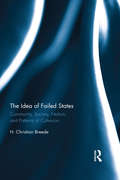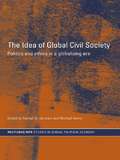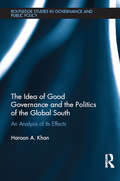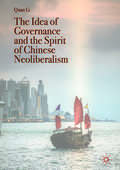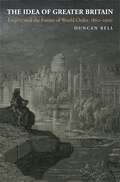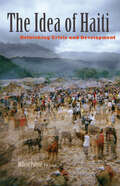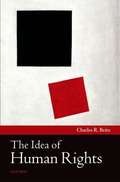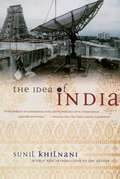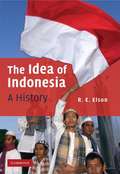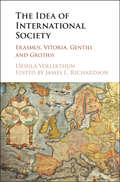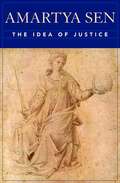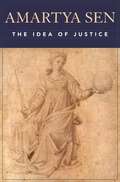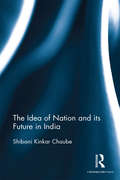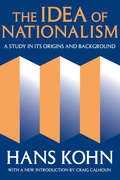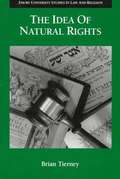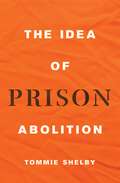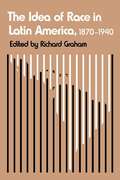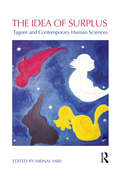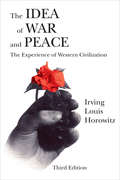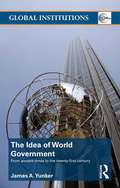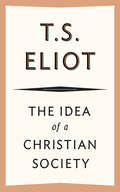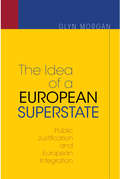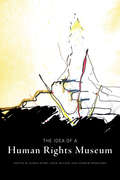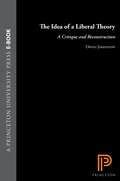- Table View
- List View
The Idea of Failed States: Community, Society, Nation, and Patterns of Cohesion
by H. Christian BreedeWhy are some states able to deliver public services to their citizens while others cannot? Why are some states beset by internal conflict that leaves many impoverished? Much of what has become known as the failed states literature attempts to engage with these questions, but does so in way that betrays a particular bias, engaging in advocacy for intervention rather than analysis. The Idea of Failed States directly challenges existing thinking about conventional state strength as it finds that institutional approaches to state strength obscure as much as they reveal. The question of why some states are strong and others weak has traditionally been addressed using measures of economic growth, resources, and quality of life. This book compares the dimensions of state strength characterised by community, society, and nation and uses social capital concepts to further illuminate them. Applying this approach across forty-two countries shows ‘weak’ states exhibiting a consistent and unique patterns of relationships between community, society, and nation as well as equally consistent and unique relationships in strong states. A blend of theory and empirics, The Idea of Failed States present a new way to think about the state – one that applies to both strong and weak alike. This work should be of interest to students and scholars researching social capital, public policy, international development and security studies.
The Idea of Global Civil Society: Ethics and Politics in a Globalizing Era (RIPE Series in Global Political Economy #Vol. 15)
by Michael Kenny Randall D. GermainThis book evaluates the claim that in order to explore the changing social foundations of global power relations today, we need to include in our analysis an understanding of global civil society, particularly if we also wish to raise ethical questions about the changing political and institutional practices of transnational governance. Bridging the normative concerns of political theorists with the historical and institutional focus of scholars of international relations and international political economy, this book is of broad interest to students and researchers concerned with international relations, civil society, global governance and ethics.
The Idea of Good Governance and the Politics of the Global South: An Analysis of its Effects (Routledge Studies in Governance and Public Policy)
by Haroon A. KhanOne of the major objectives of good governance is human development. Many worry that without good governance, many developing countries may become failed states. Using one of the worst industrial disasters in Bangladesh to date, Haroon A. Khan helps further our understanding of the importance of bureaucratic capacity for achieving good governance and offers a new paradigm for a merit system to improve governance. In doing so, he introduces the reader to the concept of good governance and its importance by investigating its relationship with failed states, globalization, bureaucratic effectiveness, and human development. The Idea of Good Governance and the Politics of the Global South will be useful for the students interested in political science, public administration and international relations.
The Idea of Good Governance and the Politics of the Global South: An Analysis of its Effects (Routledge Studies in Governance and Public Policy)
by Haroon A. KhanOne of the major objectives of good governance is human development. Many worry that without good governance, many developing countries may become failed states. Using one of the worst industrial disasters in Bangladesh to date, Haroon A. Khan helps further our understanding of the importance of bureaucratic capacity for achieving good governance and offers a new paradigm for a merit system to improve governance. In doing so, he introduces the reader to the concept of good governance and its importance by investigating its relationship with failed states, globalization, bureaucratic effectiveness, and human development. The Idea of Good Governance and the Politics of the Global South will be useful for the students interested in political science, public administration and international relations.
The Idea of Governance and the Spirit of Chinese Neoliberalism
by Quan LiThis book offers a critical assessment of governance ideas in the context of Chinese neoliberalism. It argues that the Chinese version of governance has emerged as an important discursive practice in the articulation of the neoliberal spirit of the national reform agenda. The book first examines the institutional and intellectual background of governance ideas, capturing the key features of neoliberalization in transitional China. The main body of investigation is an interpretive analysis of governance in terms of its normative principles and technical skills, which effectively package the mature neoliberal vision and reality so that it indicates the dominant ruling structure of Chinese neoliberalism. The subsequent analysis presents a genealogical review of governance discourse and traces its adaptation to local neoliberal experiments. The book concludes with reflections on possible ways of critical engagement with governance ideas and with the intellectual aspects of neoliberalism.
The Idea of Greater Britain: Empire and the Future of World Order, 1860-1900
by Duncan BellDuring the tumultuous closing decades of the nineteenth century, as the prospect of democracy loomed and as intensified global economic and strategic competition reshaped the political imagination, British thinkers grappled with the question of how best to organize the empire. Many found an answer to the anxieties of the age in the idea of Greater Britain, a union of the United Kingdom and its settler colonies in Australia, Canada, New Zealand, and southern Africa. In The Idea of Greater Britain, Duncan Bell analyzes this fertile yet neglected debate, examining how a wide range of thinkers conceived of this vast "Anglo-Saxon" political community. Their proposals ranged from the fantastically ambitious--creating a globe-spanning nation-state--to the practical and mundane--reinforcing existing ties between the colonies and Britain. But all of these ideas were motivated by the disquiet generated by democracy, by challenges to British global supremacy, and by new possibilities for global cooperation and communication that anticipated today's globalization debates. Exploring attitudes toward the state, race, space, nationality, and empire, as well as highlighting the vital theoretical functions played by visions of Greece, Rome, and the United States, Bell illuminates important aspects of late-Victorian political thought and intellectual life.
The Idea of Haiti: Rethinking Crisis and Development
by Millery PolynéAfter Haiti was struck by a devastating earthquake on January 12, 2010, aid workers and offers of support poured in from around the world. Tellingly, though, news reports on the catastrophe and relief efforts frequently included a pejorative description of the country that outsiders were determined to rebuild: the troubled island nation, a nation plagued by political violence. There was much talk of inventing a &“new&” Haiti, which would presumably mimic Western modes of development and thus mitigate political instability and crisis. As contributors to this wide-ranging book reveal, Haiti has long been marginalized as an embodiment of alterity, as the other, and the idea of a new Haiti is actually nothing new. An investigation of the notion of newness through the lenses of history and literature, urban planning, religion, and governance, The Idea of Haiti illuminates the politics and the narratives of Haiti&’s past and present. The essays, which grow from original research and in-depth interviews, examine how race, class, and national development inform the policies that envision re-creating the country. Together the contributors address important questions: How will the present narratives of deviance affect international relief and rebuilding efforts? What do Haitians themselves think about Haiti, old and new? What are the potential complications and weakness of aid strategies during these trying times? And what do we mean by crisis in Haiti?Contributors: Yveline Alexis, Rutgers U; Wein Weibert Arthus, State U of Haiti; Greg Beckett, Bowdoin College; Alex Dupuy, Wesleyan U; Harley F. Etienne, U of Michigan; Robert Fatton Jr., U of Virginia; Sibylle Fischer, New York U; Elizabeth McAlister, Wesleyan U; Nick Nesbitt, Princeton U; Karen Richman, U of Notre Dame; Mark Schuller, York College (CUNY); Patrick Sylvain, Brown U; Évelyne Trouillot, State U of Haiti; Tatiana Wah, Columbia U.
The Idea of Human Rights
by Charles R. BeitzThe international doctrine of human rights is one of the most ambitious parts of the settlement of World War II. Since then, the language of human rights has become the common language of social criticism in global political life. This book is a theoretical examination of the central idea of that language, the idea of a human right. In contrast to more conventional philosophical studies, Charles Beitz takes a practical approach, looking at the history and political practice of human rights for guidance in understanding the central idea. Betiz presents a model of human rights as matters of international concern whose violation by governments can justify international protective and restorative action ranging from intervention to assistance. He proposes a schema for justifying human rights and applies it to several controversial cases--rights against poverty, rights to democracy, and the human rights of women.
The Idea of India
by Sunil KhilnaniThe key book on India in the post nuclear era, with a new Introduction by the author. Our appreciation of the importance of India can only increase in light of the recent revelations of its nuclear capabilities.
The Idea of Indonesia: A History
by R. E. ElsonIndonesia the nation-state is a miraculous and unlikely construction. At first sight, the material for national unity could not be more unpromising; its history is marred by deep and often bloody internal disputation based on ideology, ethnicity, religion, and region. Yet Indonesia, as concept and as nation-state, endures and is, perhaps, beginning once again to thrive. R. E. Elson, one of the leading figures in the field, seeks to discover the origins of the idea of Indonesia in the mid-nineteenth century and explores its often vexed and troubled trajectory through to the present time. He examines why Indonesia exists, against the odds, as a nation-state, and in what different forms it has existed, seeking to explain the nation's character as it has struggled for unity and purpose. The analysis provides a chronological narrative which examines Indonesian politics, its political elites and their relationship with the Indonesian people.
The Idea of International Society: Erasmus, Vitoria, Gentili and Grotius
by Richardson James L. Vollerthun Ursula Richardson Ursula VollerthunThis book offers the first comprehensive account and re-appraisal of the formative phase of what is often termed the 'Grotian tradition' in international relations theory: the view that sovereign states are not free to act at will, but are akin to members of a society, bound by its norms. It examines the period from the later fifteenth to the mid-seventeenth centuries, focusing on four thinkers: Erasmus, Vitoria, Gentili and Grotius himself, and is structured by the author's concept of international society. Erasmus' views on international relations have been entirely neglected, but underlying his work is a consistent image of international society. The theologian Francisco de Vitoria concerns himself with its normative principles, the lawyer Alberico Gentili - unexpectedly, the central figure in the narrative - with its extensive practical applications. Grotius, however, does not re-affirm the concept, but wavers at crucial points. This book suggests that the Grotian tradition is a misnomer.
The Idea of Justice
by Amartya SenSocial justice: an ideal, forever beyond our grasp; or one of many practical possibilities? More than a matter of intellectual discourse, the idea of justice plays a real role in how—and how well—people live. And in this book the distinguished scholar Amartya Sen offers a powerful critique of the theory of social justice that, in its grip on social and political thinking, has long left practical realities far behind. The transcendental theory of justice, the subject of Sen’s analysis, flourished in the Enlightenment and has proponents among some of the most distinguished philosophers of our day; it is concerned with identifying perfectly just social arrangements, defining the nature of the perfectly just society. The approach Sen favors, on the other hand, focuses on the comparative judgments of what is “more” or “less” just, and on the comparative merits of the different societies that actually emerge from certain institutions and social interactions. At the heart of Sen’s argument is a respect for reasoned differences in our understanding of what a “just society” really is. People of different persuasions—for example, utilitarians, economic egalitarians, labor right theorists, no-nonsense libertarians—might each reasonably see a clear and straightforward resolution to questions of justice; and yet, these clear and straightforward resolutions would be completely different. In light of this, Sen argues for a comparative perspective on justice that can guide us in the choice between alternatives that we inevitably face.
The Idea of Justice
by Amartya SenCreated by the continuous feedback of a "student-tested, faculty-approved" process, RELG: WORLD, Second Edition, delivers a visually appealing and succinct print component, tear-out review cards, and a consistent online offering with CourseMate that includes an eBook and a set of interactive digital tools--all at a value-based price. This book frames different religions as encounters between the religions' adherents and individuals who are much like readers, making the subject come alive. The eBook includes numerous annotated links to videos, audio, Google Earth(tm) explorations, and primary sources.
The Idea of Nation and its Future in India
by Shibani Kinkar ChaubeThis volume is a theoretico-empirical study of nations and nationalism on a global scale. It enquires if the idea of the nation, by its own logic, is feasible and whether India fulfils the requirement of nationhood with a reasonable prospect of survival. The monograph engages with the theories of nation and nationalism and examines if they are relevant and tenable in contemporary times. It looks at the way these ideas have acted out in the Indian nation while attempting to map its future trajectory. It also asks: how do the two fundamental challenges to the idea of nation – ethnicity and class – fare in the era of globalisation; and further, how does India, a new state in an ancient society, reconceptualise the paradigm of this debate? The book will be of great interest to scholars and students of political science, political theory, history, political philosophy, and South Asian studies, as well as informed general readers.
The Idea of Nationalism: A Study in Its Origins and Background
by Hans KohnIn this sixtieth anniversary edition of The Idea of Nationalism, Craig Calhoun probes the work of Hans Kohn and the world that first brought prominence to this unparalleled defense of the national ideal in the modern West. At its publication, Saturday Review called it an enduring and definitive treatise.... [Kohn] has written a book which is less a history of nationalism than it is a history of Western civilization from the standpoint of the national idea. This edition includes an extensive new introduction by Craig Calhoun, which in itself is a substantial contribution to the history of ideas. The Idea of Nationalism comprehensively analyzes the rise of nationalism, the idea's content, and its worldwide implications from the days of Hebrew and Greek antiquity to the eve of the French Revolution. As Calhoun explains, Kohn was particularly qualified to undertake this study. He grew up in Prague, the vigorous heart of Czech nationalism, participated in the Zionist student movement, studied the question of nationality in multinational cultures, spent the World War One years in Asian Russia, and later traveled extensively in the Near East studying the nationalist movements of western and southern Asia. The work itself is the product of Kohn's later years at Harvard University. In The Idea of Nationalism, Kohn presents the single most influential articulation of the distinction between civic and ethnic nationalism. This has shaped nearly all ensuing research and public discussion and deeply informed parallel oppositions of early and late, Western and Eastern varieties of nationalism. Kohn also argues that the age of nationalism represents the first period of universal history. Civilizations and continents are brought into ever closer contact; popular participation in politics is enormously increased; and the secular state is ever more significant.The Idea of Nationalism is important both in itself and because it so deeply sha
The Idea of Natural Rights: Studies on Natural Rights, Natural Law and Church Law, 1150-1625
by Brian Tierney. " . . a compelling historical account of natural rights. . . . That Tierney brings to his historical task a thorough acquaintance with major contemporary theories of moral and legal rights gives his work additional value for ethicists. " - Religious Studies Review . " . . a tour de force of integration and learning. . . . It is a synthesis that will become the required starting point in all future efforts to write about the history of rights. " - Studia canonica This series, originally published by Scholars Press and now available from Eerdmans, is intended to foster exploration of the religious dimensions of law, the legal dimensions of religion, and the interaction of legal and religious ideas, institutions, and methods. Written by leading scholars of law, political science, and related fields, these volumes will help meet the growing demand for literature in the burgeoning interdisciplinary study of law and religion.
The Idea of Prison Abolition (Carl G. Hempel Lecture Series #13)
by Tommie ShelbyAn incisive and sympathetic examination of the case for ending the practice of imprisonmentDespite its omnipresence and long history, imprisonment is a deeply troubling practice. In the United States and elsewhere, prison conditions are inhumane, prisoners are treated without dignity, and sentences are extremely harsh. Mass incarceration and its devastating impact on black communities have been widely condemned as neoslavery or &“the new Jim Crow.&” Can the practice of imprisonment be reformed, or does justice require it to be ended altogether? In The Idea of Prison Abolition, Tommie Shelby examines the abolitionist case against prisons and its formidable challenge to would-be prison reformers.Philosophers have long theorized punishment and its justifications, but they haven&’t paid enough attention to incarceration or its related problems in societies structured by racial and economic injustice. Taking up this urgent topic, Shelby argues that prisons, once reformed and under the right circumstances, can be legitimate and effective tools of crime control. Yet he draws on insights from black radicals and leading prison abolitionists, especially Angela Davis, to argue that we should dramatically decrease imprisonment and think beyond bars when responding to the problem of crime.While a world without prisons might be utopian, The Idea of Prison Abolition makes the case that we can make meaningful progress toward this ideal by abolishing the structural injustices that too often lead to crime and its harmful consequences.
The Idea of Race in Latin America, 1870-1940
by Richard GrahamFrom the mid-nineteenth century until the 1930s, many Latin American leaders faced a difficult dilemma regarding the idea of race. On the one hand, they aspired to an ever-closer connection to Europe and North America, where, during much of this period, "scientific" thought condemned nonwhite races to an inferior category. Yet, with the heterogeneous racial makeup of their societies clearly before them and a growing sense of national identity impelling consideration of national futures, Latin American leaders hesitated. What to do? Whom to believe?Latin American political and intellectual leaders' sometimes anguished responses to these dilemmas form the subject of The Idea of Race in Latin America. Thomas Skidmore, Aline Helg, and Alan Knight have each contributed chapters that succinctly explore various aspects of the story in Brazil, Argentina, Cuba, and Mexico. While keenly alert to the social and economic differences that distinguish one Latin American society from another, each author has also addressed common issues that Richard Graham ably draws together in a brief introduction. Written in a style that will make it accessible to the undergraduate, this book will appeal as well to the sophisticated scholar.
The Idea of Surplus: Tagore and Contemporary Human Sciences
by Mrinal MiriThis book provides an analytical understanding of some of Tagore’s most contested and celebrated works and ideas. It reflects on his critique of nationalism, aesthetic worldview, and the idea of ‘surplus in man’ underlying his life and works. It discusses the creative notion of surplus that stands not for ‘profit’ or ‘value’, but for celebrating human beings’ continuous quest for reaching out beyond one’s limits. It highlights, among other themes, how the idea of being ‘Indian’ involves stages of evolution through a complex matrix of ideals, values and actions—cultural, historical, literary and ideological. Examining the notion of the ‘universal’, contemporary scholars come together in this volume to show how ‘surplus in man’ is generated over the life of concrete particulars through creativity. The work brings forth a social scientific account of Tagore’s thoughts and critically reconstructs many of his epochal ideas. Lucid in analysis and bolstered with historical reflection, this book will be a major intervention in understanding Tagore’s works and its relevance for the contemporary human and social sciences. It will interest scholars and researchers of philosophy, literature and cultural studies.
The Idea of War and Peace: The Experience of Western Civilization (Comparative Policy Evaluation Ser.)
by Irving HorowitzModern theorists and their ideas on war and peace are here presented, interpreted, and evaluated with scholarship and clarity of expression. In examining the main currents in modern social theory, the author has gone directly to the works of the leading philosophic figures. This book is a carefully documented analysis based on primary sources. Its republication in an expanded version after more than a half century since its initial appearance is a welcome addition to the literature on conflict and conflict resolution.In this 2007 greatly expanded third edition of The Idea of War and Peace, Irving Louis Horowitz provides a sense of substance to the character of Western Civilization. The book permits the reader to better understand what the "clash of civilizations" is about. It provides a broad outline of both European and American twentieth century social philosophies as they relate to the issue of war and peace. It also offers a new concluding section that explores in depth this same theme in the first decade of the twenty-first century.Such major figures as Bertrand Russell, John Dewey, Jacques Maritain, Albert Einstein, and Vladimir Lenin, reviewed in earlier editions, are now joined by examinations of the work of Raymond Aron, Harold D. Lasswell, and other contemporaries. The Idea of War and Peace is not just one more manual of how to conduct or avoid conflict, and even less, a guideline to policy-making. Instead, the work offers a profound sense of the theories and values that underline manuals and guides.This third edition is graced by a consideration of major figures in the second half of the twentieth century and a retrospective on the work of Niccolo Machiavelli on the nature of warfare. It also includes chapters on the relationship of war, peace, and the democratic order--and a postscript on new forms of state power and terrorism. This new edition links past and present and serves as an analytical bridge between cen
The Idea of World Government: From ancient times to the twenty-first century (Global Institutions)
by James A. YunkerThe notion of a single political organization encompassing the whole of humanity—a world state—has intrigued mankind since earliest recorded history. This book provides a concise yet comprehensive overview of the history of world government, and questions whether political globalization, in the form of a federal world government, could and should complement the ongoing processes of economic and cultural globalization. While the potential peacekeeping advantage of such a state is obvious, the consensus judgment has always been against it, because it could lead to totalitarian tyranny. Yunker examines whether this judgment is still correct, considering that nuclear weapons of unimaginable destructiveness now exist, capable of destroying human civilization as we know it. Summarizing the lessons of history, the author suggests that while the conventional world federalist concept of an unlimited world government is still impractical in today’s world, there may be a role for a limited federal world government that would go well beyond the existing United Nations, thereby providing a stronger institutional basis for the evolutionary development of genuinely effective global governance. This book is an important resource for all students and scholars of global governance, international relations and international organizations.
The Idea of a Christian Society
by T. S. EliotOne of the twentieth century&’s great thinkers and writers explores what it means to incorporate Christian values into our worldly lives. Originally delivered in 1939 at Corpus Christi College, these three lectures by the renowned poet and playwright T. S. Eliot address the direction of religious thought toward criticism of political and economic systems. With sincerity and intellectual rigor, the Nobel Prize winner asks whether—and how—it is possible for Christianity to coexist with Western democracy and capitalism.
The Idea of a European Superstate: Public Justification and European Integration - New Edition
by Glyn MorganIs there a justification for European integration? The Idea of a European Superstate examines this--the most basic--question raised by the European Union. In doing so, Glyn Morgan assesses the arguments put forward by eurosceptics and their critics. In a challenge to both sides of the debate, Morgan argues in support of a European superstate. Unless Europe forms a unitary sovereign state, Europe will remain, so he maintains, weak and dependent for its security on the United States. The Idea of a European Superstate reshapes the debate on European political integration. It throws down a gauntlet to eurosceptics and euro-enthusiasts alike. While employing the arguments of contemporary political philosophy and international relations, this book is written in an accessible fashion that anyone interested in European integration can understand.
The Idea of a Human Rights Museum
by Ruth B. Phillips Mary Reid A. Dirk Moses Adam Muller Andrew Woolford Angela Failler Christopher Powell Karen Busby Jennifer Carter Clint Curle Helen Fallding Jodi Giesbrecht Amanda Grzyb George Jacob Stephen Jaeger Jorge A. Nállim Ken Norman Armando Perla David Petrasek Roger I. Simon Struan Sinclair"The Idea of a Human Rights Museum" is the first book to examine the formation of the Canadian Museum for Human Rights and to situate the museum within the context of the international proliferation of such institutions. Sixteen essays consider the wider political, cultural and architectural contexts within which the museum physically and conceptually evolved drawing comparisons between the CMHR and institutions elsewhere in the world that emphasize human rights and social justice. This collection brings together authors from diverse fields—law, cultural studies, museum studies, sociology, history, political science, and literature—to critically assess the potentials and pitfalls of human rights education through “ideas” museums. Accessible, engaging, and informative, the collection’s essays will encourage museum-goers to think more deeply about the content of human rights exhibits. The Idea of a Human Rights Museum is the first title in the University of Manitoba Press’s Human Rights and Social Justice Series. This series publishes work that explores the quest for social justice and the basic rights and freedoms to which all human beings are entitled, including civil, political, economic, social, collective, and cultural rights.
The Idea of a Liberal Theory: A Critique and Reconstruction
by David JohnstonLiberalism, the founding philosophy of many constitutional democracies, has been criticized in recent years from both the left and the right for placing too much faith in individual rights and distributive justice. In this book, David Johnston argues for a reinterpretation of liberal principles he contends will restore liberalism to a position of intellectual leadership from which it can guide political and social reforms. He begins by surveying the three major contemporary schools of liberal political thought--rights-based, perfectionist, and political liberalism--and, by weeding out their weaknesses, sketches a new approach he calls humanist liberalism.The core of Johnston's humanist liberalism is the claim that the purpose of political and social arrangements should be to empower individuals to be effective agents. Drawing on and modifying the theories of John Rawls, Michael Walzer, Ronald Dworkin, Joseph Raz, Amartya Sen, and others, Johnston explains how this purpose can be realized in a world in which human beings hold fundamentally different conceptions of the ends of life. His humanist liberalism responds constructively to feminist, neo-Marxist, and other criticisms while remaining faithful to the core values of the liberal tradition.
